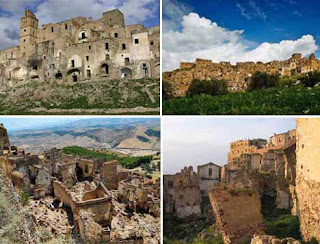1. Craco |
| This medieval village in Italy was built on a very steep summit for defensive reasons, in a dry and mostly vegetation-free area in the south of the country. Over the centuries, this village lost residents due to a plague, French occupation and civil unrest, and finally lost nearly all of its residents between 1892 and 1922 as they fled for America due to poor agricultural conditions. Earthquakes in the 60s forced the remaining occupants out of the city, and it's now completely uninhabited. 2. Kowloon Walled City |
The Kowloon Walled City, located just outside Hong Kong, was occupied by Japan during World War II and subsequently taken over by squatters after Japan's surrender. Neither Britain nor China wanted responsibility for it, so it became its own lawless city. Its population flourished for decades. It was a place where brothels, casinos, opium dens, cocaine parlors, food courts serving dog meat and secret factories ran unmolested by authorities. It was finally torn down in 1993 after a mutual decision was made by British and Chinese authorities, who had finally grown wary of the unsanitary, anarchic city and its out-of-control population. 3. Gunkan-jima |
The forbidden island is one among 505 uninhabited islands in the Nagasaki Prefecture of Japan about 15 kilometers from Nagasaki itself. It is also known as "Gunkan-jima" or Battleship Island thanks to its high sea walls. It began in 1890 when a company called Mitsubishi bought the island and began a project to retrieve coal from the bottom of the sea. This attracted much attention, and in 1916 they were forced to build Japan's first large concrete building on the island. A block of apartments that would both accommodate the seas of workers and protect them from hurricanes. 4. Mandu |
Located south of Indore in the state of Madhya Pradesh, Mandu was once the capital city of a northern Indian Muslim state and has lain abandoned for over 400 years. The ancient city takes up a large plateau just above the Narmada River and is home to a dazzling array of ruins, including a royal palace and a mosque. The Nil Kanth Palace is an important pilgrimage point for devotees of the Hindu goddess Shiva. Today, the city's only residents are gypsy tribes who live on the hilltop plateau. 5. Humberstone |
Humberstone in Chile was a booming town from the 1920s until the early 40s, enjoying the wealth and prosperity that came from mining and processing nitrate, also known as saltpeter. Once synthetic saltpeter was invented, the town began to decline and experienced a slow outpouring of residents until it finally lay empty in 1961. Since then, the blowing sand from surrounding deserts has made its way into the remaining buildings, which still house machinery and furniture. The town has been named a World Heritage Site and will likely be preserved as a historical monument. 6. San Zhi |
7. Prypiat | ||
|
8. Famagusta |
Famagusta is a settlement in the unrecognised Republic of Northern Cyprus. Prior to the 1974 Turkish invasion of Cyprus, it was the modern tourist area of the city of Famagusta. For the last three decades, it has been left as a ghost town. In the 1970s, the city was the number one tourist destination in Cyprus. To cater to the increasing number of tourists, many new high-rise buildings and hotels were constructed. 9. Times Beach |
Once home to 2200 residents, Times Beach, Missouri stood empty and condemned for over a decade. It is the site of one of America's worst pollution disasters. From 1972 to 1976, city officials had waste oil sprayed on the unpaved roads to alleviate a dust problem. Unfortunately, that waste oil contained dioxin, a toxic carcinogen and component of Agent Orange. The dioxin permeated the soil and flooding further spread it through the town. After a long cleanup effort, the town has been reborn as Route 66 State park. 10. Kadykchan |
Kadykchan was one of many small Russian cities that fell into ruin when the Soviet Union collapsed. Residents were forced to move to gain access to services like running water, schools and medical care. The state moved them out over a period of two weeks, and they were taken to other towns and provided with new housing. Once a tin mining town of 12,000 people, the city is now desolate. In their hurry to leave, residents left their belongings behind in their homes, so you can now find aging toys, books, clothing and other objects throughout the empty city. |


























0 comments:
Post a Comment